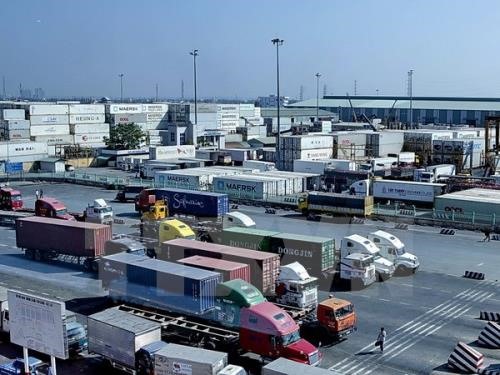 Society
Society

Eco-driving techniques have helped reduce fuel consumption and costs for freight transport firms under a three-year project that ends this month.
 |
| A three-year project that ends this month improved sustainable freight transport and logistics standards in the Mekong Region. — VNA/VNS Photo Trần Lê Lâm |
HCM CITY — Eco-driving techniques have helped reduce fuel consumption and costs for freight transport firms under a three-year project that ends this month.
The project promoted sustainable freight transport and logistics through energy efficiency and safety measures at 500 small- and medium-sized enterprises (SMEs) in Cambodia, Lao, Myanmar, Việt Nam and Thailand.
In the past three years, fuel efficiency improved at 400 SMEs and micro-enterprises, while transport of dangerous goods of at least 80 SMEs became safer.
In addition, companies invested more in fuel efficiency and enhanced safety measures and leading SMEs started green-freight labelling.
Speaking at a project workshop held recently in HCM City, Nguyễn Công Bằng, of the Ministry of Transport, said: “In Việt Nam, more than 100 SMEs in the transport sector have participated in project’s activities and have been able to improve fuel consumption savings by 11.70 per cent per 100km for heavy-duty empty trucks and 11.4 per cent per 100km for heavy-duty loaded trucks."
“To implement the Protocol 9-ASEAN Cross Border Transport Agreement, Việt Nam needs to improve the capacity of drivers and strengthen its policy, rules and regulations for the transport of dangerous goods,” Bằng said.
He said the three-year project was instrumental in raising the awareness and capacity of traffic police and inspectors.
Tom Corrie, deputy head of co-operation at the EU Delegation to Việt Nam, said: “Việt Nam has been one of the fastest-growing economies in Asia in recent years, and the Government has allowed foreign direct investment in its logistics industry. The gradually developing logistics infrastructure has been a major driver for Việt Nam’s road freight transport market.”
Road transport serves about 76 per cent of all freight transport in Việt Nam, he said.
Despite progress, Việt Nam faces challenges such as inefficient management, the widespread use of old trucks, poor regard for safety and fuel efficiency, and lack of effective policy and incentives to improve SMEs’ business performance, Corrie said.
“With this concern, the EU-funded SWITCH-Asia, which is the largest sustainable consumption and production programme supporting this region, including Việt Nam, will improve sustainability of freight transport and logistics,” he added.
The workshop was hosted by Việt Nam’s Ministry of Transport and the EU in collaboration with the Deutsche Gesellschaft für Internationale Zusammenarbeit (GIZ) GmbH. — VNS




